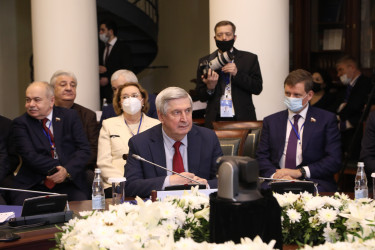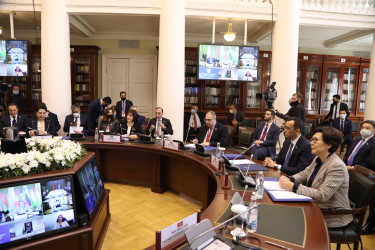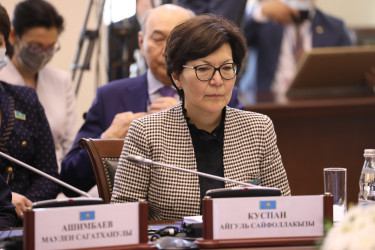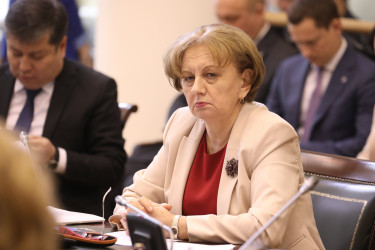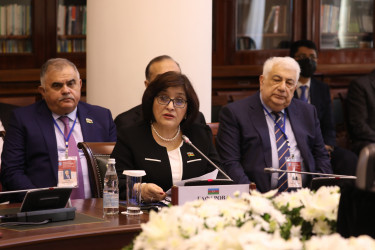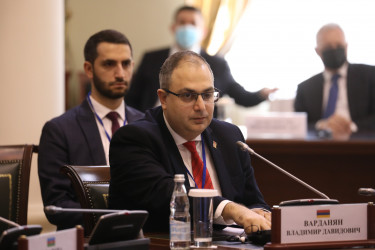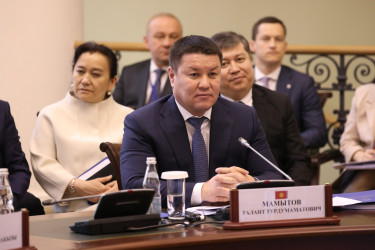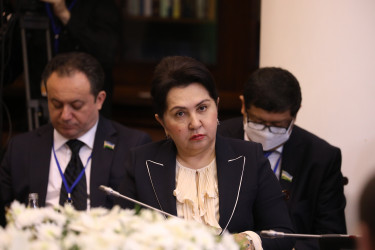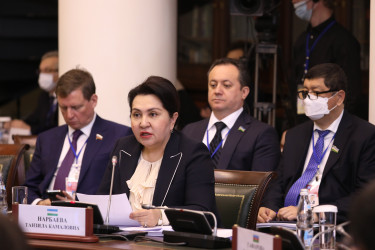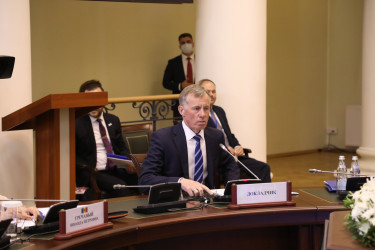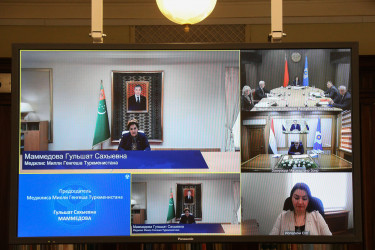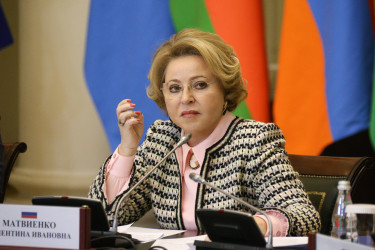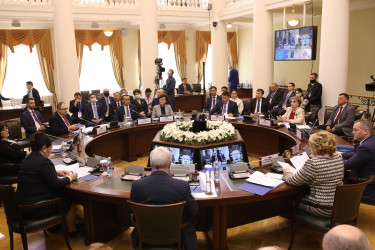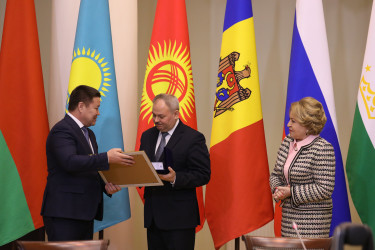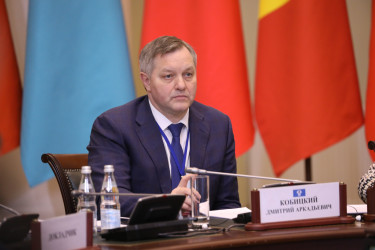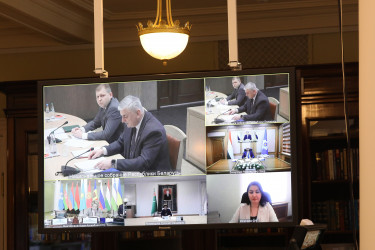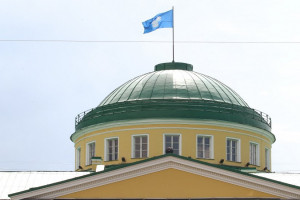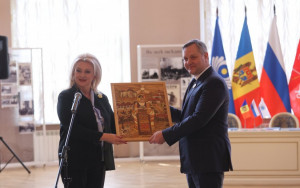Migration Issues During COVID-19 Pandemic Discussed at 52nd IPA CIS Plenary Session
16 April 2021
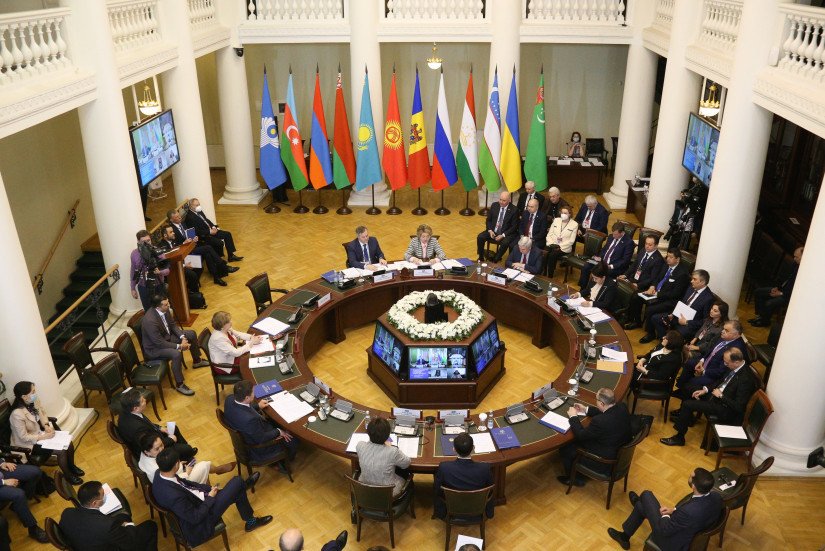
Today, the Fifty Second Plenary Session of the Interparliamentary Assembly of Member Nations of the Commonwealth of Independent States was held via videoconferencing in the Tavricheskiy Palace – the IPA CIS headquarters.
The event was opened by Chairperson of the IPA CIS Council, Speaker of the Federation Council of the Federal Assembly of the Russian Federation Valentina Matvienko. The Speaker drew the outcomes of the Assembly’s activities since the autumn session and particularly noted the International Parliamentary Conference “Global Challenges and Threats in the Context of the COVID-19 Pandemic. Terrorism and Violent Extremism” held on 15 April and organized jointly with the OSCE PA, the PACE, the PAM and the UNOCT. “The Conference aroused great interest. Over two hundred representatives of national legislative authorities, international parliamentary and sectoral institutions took part both in the plenary sessions and in the work of four thematic sessions. Now the secretariats of the co-organizers are finalizing joint conclusions based on the results of the discussions. This document will soon be sent to the parliaments of the participating states and published on our website”, she said.
In addition, Valentina Matvienko reported on the decisions of the meeting of the IPA CIS Council, which had taken place the day before and outlined the main topic of the Fifty Second Plenary Session of the Assembly – the role of the parliaments of the IPA CIS Member Nations in the legislative regulation of migration processes during the pandemic.
Speaker of the Milli Mejlis of the Azerbaijan Republic Sahiba Gafarova addressed the participants of the Plenary Session with a welcoming speech. “During the existence of the IPA CIS, the parliaments of the Member Nations have managed to prove the inexhaustibility of the Assembly’s potential as a platform for cooperation, discussion of relevant issues of regional and international agenda, not only for communication among the CIS parliamentarians, but also for interaction with other parliamentary organizations”, she said.
Chairman of the Standing Committee of the National Assembly of the Republic of Armenia on State and Legal Affairs Vladimir Vardanyan, drew attention to the importance of resuming in-person meetings amid the restrictions caused by the pandemic.
Speaker of the Mejlis of Turkmenistan Gulshat Mammedova commended the legislative activity of the Assembly: “The CIS Interparliamentary Assembly is the main platform for interaction among the CIS parliamentarians. The legislative acts considered at the meetings of the IPA CIS permanent commissions play a significant role in the legislative support of the Commonwealth”, she noted.
Further, the speakers of parliaments and heads of relevant European organizations made reports on the “regulation of migration processes during the pandemic and the role of the CIS parliaments in this process”.
Speaker of the Council of the Republic of the National Assembly of the Republic of Belarus Natalya Kochanova spoke about the Belarusian migration legislation and migration policy pursued by the state in accordance with generally recognized norms of international law.
Speaker of the Senate of the Parliament of the Republic of Kazakhstan Maulen Ashimbayev pointed out the relevance of the problem brought up at the meeting. “The processes of integration and globalization increase the mobility of people and the intensity of migration. In the 21st century, the processes of free movement of people and labor have reached unprecedented scale. At the same time, since last year, efforts to combat the coronavirus pandemic have led to a temporary restriction of international migration. Most countries had to solve a difficult task: on the one hand, to protect the population and prevent the spread of the infection, which required a sharp restriction of human mobility, and on the other, to minimize the economic damage from such measures”, he said and informed the participants on the actions taken in this regard in the Republic of Kazakhstan.
Speaker of the Jogorku Kenesh of the Kyrgyz Republic Talant Mamytov recalled that 2021 marked the 30th anniversary of the establishment of the Commonwealth of Independent States. “Today we can say with confidence that the CIS has successfully emerged as an effective regional platform for interaction between the states of the Eurasian space”, he said and noted the important role of the Interparliamentary Assembly.
Speaker of the Parliament of the Republic of Moldova Zinaida Greceanîi drew attention to the special vulnerability of labor migrants in the face of pandemic restrictions.
Speaker of the Senate of the Oliy Majlis of the Republic of Uzbekistan Tanzila Narbaeva welcomed the approval of the Model Migration Code for the CIS Member Nations. She also recalled that during the 75th Session of the UN General Assembly, President of the Republic of Uzbekistan Shavkat Mirziyoyev proposed to adopt an international Code of Voluntary Commitment of States during Pandemics, which should reflect the obligations of states to their citizens and international partners.
Regional Director for Europe of the World Health Organization Hans Kluge noted the important role of the parliaments in the field of health and expressed gratitude to the CIS Interparliamentary Assembly, which adopts model legislation aimed at providing effective support to the most vulnerable population.
Chair of the Council of the Heads of CIS Migration Authorities, First Deputy Minister of Internal Affairs of the Russian Federation Alexander Gorovoy spoke about the real state of affairs in the field of migration in the Russian Federation and the impact of the pandemic on migration processes. He called on the representatives of the CIS Member Nations participating in the Plenary Session to provide assistance to the authorized bodies of the Russian Federation in regulating migration processes.
Head of the Regional Office for Europe of the International Federation of Red Cross and Red Crescent Societies Birgitte Bischoff Ebbezen drew attention to the importance of coordinating the efforts of the international community in overcoming the consequences of the COVID-19 pandemic.
Director of the Bureau in Moscow of the International Organization for Migration Abdusattor Esoev focused on the scale of the pandemic restrictions. According to him, 226 countries and territories have introduced a total of 110,000 various restrictive measures in 2020 alone. Obviously, in this unprecedented situation, most of the usual legal mechanisms have proved inapplicable. “In the future, a new format of migration relations should be created that can work in emergency situations”, suggested the expert.
Deputy Director of the European Bureau of the United Nations High Commissioner for Refugees Angela Lee Rosi spoke about the measures taken by the organization during the pandemic, including the use of platforms and tools to adhere to the principles of privacy.
At the end of the discussion, the MPs discussed the Model Migration Code for the CIS Member Nations. This document was developed as a structured legislative act of a recommendatory nature that could be possibly used by the CIS Member Nations in the development of national migration codes or amendments and additions to the existing migration codes to harmonize legal regulation in the field of migration across the Commonwealth. It is expected that the Code will also contribute to the convergence and unification of law enforcement practice in the process of implementation of interstate agreements in the field of migration by the CIS Member Nations. .
The Plenary Session also considered the Model Law on Ensuring Children’s Rights to Health Care in the CIS Member Nations, the Model Law on Psychiatric Care and Guarantees of the Citizens’ Rights for its Provision, the Model Law on CIS Clinical Recommendations in Provision of Medical Care, the Recommendations on Access to Information on the Legal Status of Citizens, as well as the Model Law on Regional Investment Projects.
At the end of the meeting, Speaker of the Jogorku Kenesh of the Kyrgyz Republic Talant Mamytov handed over the IPA CIS Chingiz Aytmatov prize to literary critic, writer, Honored Figure of Culture of the Republic of Belarus, academician of the National Academy of Sciences of the Republic of Belarus, Doctor of Philology, Professor Vladimir Gnilomedov. Deputy Secretary General of the IPA CIS Council – Plenipotentiary Representative of the National Assembly of the Republic of Belarus Viktor Kogut received the prize on behalf of Vladimir Gnilomedov.


